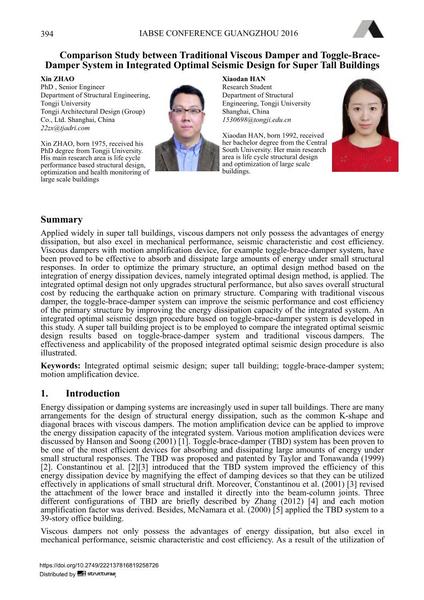Comparison Study between Traditional Viscous Damper and Toggle-Brace-Damper System in Integrated Optimal Seismic Design for Super Tall Buildings

|
|
|||||||||||
Détails bibliographiques
| Auteur(s): |
Xin Zhao
XiaoDan Han |
||||
|---|---|---|---|---|---|
| Médium: | papier de conférence | ||||
| Langue(s): | anglais | ||||
| Conférence: | IABSE Conference: Bridges and Structures Sustainability - Seeking Intelligent Solutions, Guangzhou, China, 8-11 May 2016 | ||||
| Publié dans: | IABSE Conference, Guangzhou, China, 8 – 11 May 2016 | ||||
|
|||||
| Page(s): | 394-400 | ||||
| Nombre total de pages (du PDF): | 7 | ||||
| Année: | 2016 | ||||
| DOI: | 10.2749/222137816819258726 | ||||
| Abstrait: |
Applied widely in super tall buildings, viscous dampers not only possess the advantages of energy dissipation, but also excel in mechanical performance, seismic characteristic and cost efficiency. Viscous dampers with motion amplification device, for example toggle-brace-damper system, have been proved to be effective to absorb and dissipate large amounts of energy under small structural responses. In order to optimize the primary structure, an optimal design method based on the integration of energy dissipation devices, namely integrated optimal design method, is applied. The integrated optimal design not only upgrades structural performance, but also saves overall structural cost by reducing the earthquake action on primary structure. Comparing with traditional viscous damper, the toggle-brace-damper system can improve the seismic performance and cost efficiency of the primary structure by improving the energy dissipation capacity of the integrated system. An integrated optimal seismic design procedure based on toggle-brace-damper system is developed in this study. A super tall building project is to be employed to compare the integrated optimal seismic design results based on toggle-brace-damper system and traditional viscous dampers. The effectiveness and applicability of the proposed integrated optimal seismic design procedure is also illustrated. |
||||
